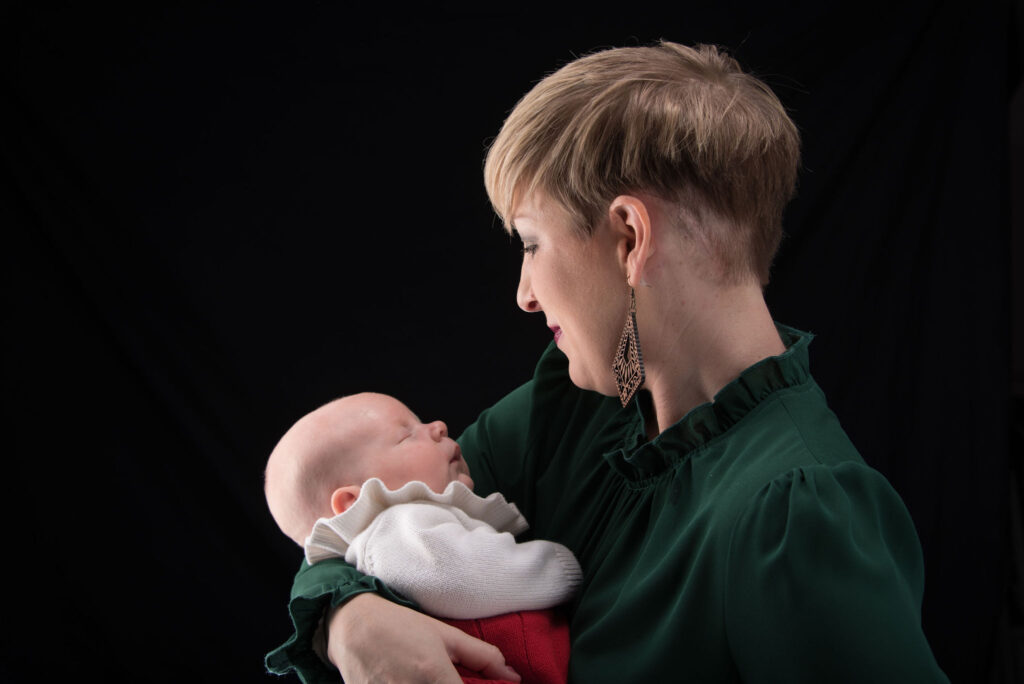I had a baby and a craniotomy in the same week.
In the summer of 2020, about halfway through my fourth pregnancy, I started having headaches that got progressively worse until, by the end of pregnancy, they were completely debilitating.
I also noticed, around that same time, that I had lost the hearing in my left ear. I chalked it up to allergies and being congested.
But by the end of August, I started noticing I was having issues with my balance. Like, I couldn’t walk in a straight line, and I was always bumping into doorways.
I chalked it all up to pregnancy symptoms.
But as my headaches worsened, I promised that I would figure them out after the baby was born.
Four days after delivering our sweet baby girl in October, I was in so much pain from my headache that I could not function. My husband Matt took me to the emergency room an hour from home, where an MRI showed that I had a large brain tumor and severe swelling in my brain. I needed emergency brain surgery.
My first hurdle was just getting to Swedish Medical Center in Denver where the brain surgery needed to be performed.
It was sleeting and foggy and icy outside, so no helicopters were flying. Due to other emergencies, no ambulance crew was available either. But the ER physician that night was one I had worked with for seven years when we lived in Scottsbluff, Nebraska. He went above and beyond and found an ambulance from Torrington to transport me to Denver — a 4-hour ride.
But because of the medication I needed immediately, and during my transport, a registered nurse needed to be with me. While I was having the MRI, Matt had called one of our closest friends, and she was in the ER with us. She happens to be a flight nurse. She clocked in and rode with me in the ambulance to Denver.
Once I arrived at Swedish, I continued on the medication to decrease the swelling in my brain enough to make it safe for me to have surgery.
My surgeon estimated from the size of the tumor that it had been there for maybe five or six years. It finally got big enough that my brain couldn’t compensate anymore, and it was blocking fluid from going out of my brain.
Although I remained optimistic about the surgery, I also was realistic, knowing that there was no guarantee that I would come out of surgery without any lifelong disabilities – or that I would even survive the surgery. Up until this point in my 36 years, I’d never had surgery or been under anesthesia.
In the two and a half days of waiting for the swelling to go down enough so that I could safely have surgery, I wrote messages and made videos on my phone to my husband and each kid.
My family was on my mind the whole time.
At one point, I broke down, feeling upset that I couldn’t spend those first few precious days after birth bonding with my newborn.
I was using FaceTime to talk to my mother-in-law, who was holding the baby, and I started crying and asked, “What if my baby doesn’t know me when I get home?” I hadn’t really gotten to know her, and I didn’t know how long I was going to be in the hospital.
But my mother-in-law, God bless her, reassured me that my baby would still know me.
Speaking of that newborn, my friend who had ridden in the ambulance with me had put out the call that night for milk donors. Some of our friends, and even my midwife, donated breastmilk for the baby. We had enough to last us the entire time that I couldn’t nurse her.
My surgeons prepared my husband that he would have a long wait. They predicted that surgery would take 12-16 hours because of the size, vascularity, and complexity of the tumor.
I was now seven days postpartum — and it was time for surgery.
I started out by going to Interventional Radiology, where they did a procedure — an angiogram — where they went in through a vein in my groin, all the way up to my brain, so that they could cauterize some of the many vessels in and around the tumor to make surgery safer.
They took me straight from there to the operating room, since I was already under anesthesia. Swedish Medical Center is amazing if I haven’t already said it.
The surgery itself, miraculously, only took FOUR hours. Four hours! And they were able to remove the entire 6-centimeter tumor.
I was supposed to stay intubated for the day following surgery because my surgeons weren’t sure if I would be able to keep my airway open on my own or swallow properly. I was extubated just a few hours after surgery (partly because I tried to do it myself) and had no trouble with swallowing or breathing.
It was a possibility that after surgery, I could still have issues with my balance, weakness on my left side, or walking on my own. It was an amazing feeling when I woke up and realized that I could move my arms and legs and sit up and talk, and then, a few hours after surgery, I was up and walking on my own.
I’ll never forget the look on my surgeon’s face when he first walked into my room after surgery and saw me sitting up in bed. He thought I would still be on a ventilator as planned. I remember telling him, “Well, I have a husband and four little kids, including a newborn, that I really want to go home to.”
Later that day, I was moved out of the ICU into a regular hospital room. “Sometimes the strength of motherhood is greater than natural laws,” as Barbara Kingsolver said in her book “Homeland.”
And then, just three days after major brain surgery, by the grace of God, I walked out of the hospital on my own two feet.
That tumor was benign — a grade 1 meningioma, to be precise. About six weeks after surgery, the hearing in my left ear returned.
I’m one of the lucky ones. I got to come home to my family. I get to raise my kids.
Unfortunately, there are an estimated one million Americans living with a brain tumor. Research is underfunded, and organizations like the National Brain Tumor Society “invest in the brain tumor community to discover a cure, deliver effective treatments, and advocate for patients and caregivers.”
Before my diagnosis, I was naively unaware of the sheer number of people that brain tumors impact. I’m joining hands with the NBTS because I don’t want anyone else to suffer the way I did. By the time my tumor was discovered, it was almost too late. I want to use this platform to help patients and providers alike gain awareness and come alongside us to make a difference in the discovery and treatment of brain tumors.
I want to use my experience to help others advocate for their health. Along with the NBTS, we can help influence and fund much-needed research in the area of brain tumor treatments and cures.
What I went through was traumatic for myself and my family. Thank you to the NBTS for working tirelessly to make sure that, hopefully, one day, no one else will have to suffer the effects of a brain tumor.




